七年级下unit2复习
七年级英语下册unit2知识点总结
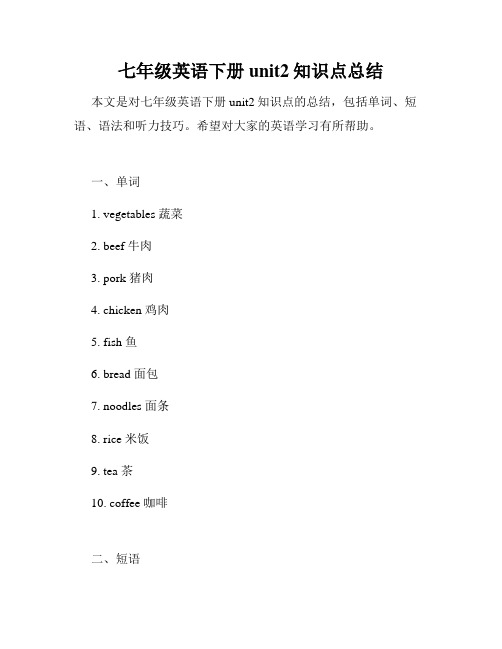
七年级英语下册unit2知识点总结本文是对七年级英语下册unit2知识点的总结,包括单词、短语、语法和听力技巧。
希望对大家的英语学习有所帮助。
一、单词
1. vegetables 蔬菜
2. beef 牛肉
3. pork 猪肉
4. chicken 鸡肉
5. fish 鱼
6. bread 面包
7. noodles 面条
8. rice 米饭
9. tea 茶
10. coffee 咖啡
二、短语
1. have for breakfast/lunch/dinner 早/午/晚餐吃什么
2. be good for 对……有好处
3. eat a balanced diet 饮食平衡
4. drink milk 喝牛奶
5. in the morning/afternoon/evening 早晨/下午/晚上
三、语法
1. 动词的时态:一般现在时、一般过去时、现在进行时
2. 人称代词的主格和宾格
3. 数词的用法
4. 物主代词的用法
四、听力技巧
1. 注意听题,认真听录音
2. 选项一般是听力内容的重要信息,要认真分析每个选项
3. 注意语音、语调和音调,了解英语语音规律
4. 练习不同类型的听力,比如听快读、听口语、听新闻等。
以上就是七年级英语下册unit2知识点的总结。
希望大家认真学习,掌握这些知识点,提高自己的英语水平。
Unit2知识清单++默写版+2023-2024学年人教版七年级英语下册+

人教版七年级下Unit 2 What time do you go to school?基础知识梳理Section A重点单词1.__ ___ v.穿衣服n.连衣裙2. v.刷;刷净n.刷子3. n.&v.淋浴n.淋浴器(间)4. num.四十5. interj.(表示惊奇或敬佩)哇;呀6. adv.& adj.早(的)7. num. 五十8. n.工作;职业9. v. &n.工作10. n.电(视)台;车站11. adv. 表示整点……点钟12. n.晚上;夜晚13. v.&n.锻炼;练习14. adj.最好的adv.最好地;最15. n.组;群16. adv.向上17. n.牙齿(单)→(复数)18. adv.通常地;一般地19. adv.从不;绝不→(反义词) adv.总是20. adj.奇怪的;潜稽好笑的→n.乐趣;快乐重点短语1.起床;站起2.穿上衣服3.刷牙4.洗淋浴5.广播电台6.广播节目7.在晚上8.去上班去上学9.上班迟到10. (在)周末11.在上学日重点句型1.2.3.4.5. ——6.7.8.9. 你通常什么时候洗淋浴?我通常六点四十分洗淋浴。
斯科特有一份有趣的工作。
那个时间吃早饭真有意思哟!“里克什么时候吃早饭?”“他七点钟吃早饭。
”斯科特什么时候去上班?你的广播节目在几点?从夜里12点整到早上6点整。
我上班从不迟到。
Section B重点单词1. 一半;半数pron,n._________2. 一刻钟;四分之一n._________ 3.跑;奔v._________4.打扫;弄干净v.干净的adj._________ 5.或者conj.也adv._________6.大量;许多pron._________7.品尝v.味道;滋味n._________ 8.晚于prep.过去的adj._________ 9.家庭作业n._________10.行走;步行n.&v._________ 11.很快地adv._________12.生活;生命n._________13.有时adv._________★写出下列单词变形_________1.half-(复数)_________2.quickly(副词)-(形容词)_______ 3.life-(复数)_________4.one-(序数词)_________5. quarter-_(复数)_________ 6.healthy-______(反义词)-(名词)_______7.run-(现在分词)________te-(反义词)_________重点短语★根据汉语提示默写出下列短语1.回家__________________________ 2.做作业__________________________ 3.吃晚饭__________________________ 4.上床睡觉_________________________ 5.做运动_________________________ 6.一个健康的生活__________________ 7.散步;走一走____________________ 8.从学校回到家____________________ 9.去鲍勃家____________________ 10.打扫某人的房间__________________ 11.半个小时____________________12.到家____________________13.大量;许多____________________ 14.对...有好处____________________ 15.尝起来味道好____________________ 16.在下午三点一刻__________________ 17.要么...要么...;或者...或者...____________________18.在晚上差一刻七点_________________ 19.在早晨六点半__________________重点句子★根据汉语提示默写出下列句子1.在晚上,我要么看电视要么玩电脑游戏。
七下英语第二单元笔记
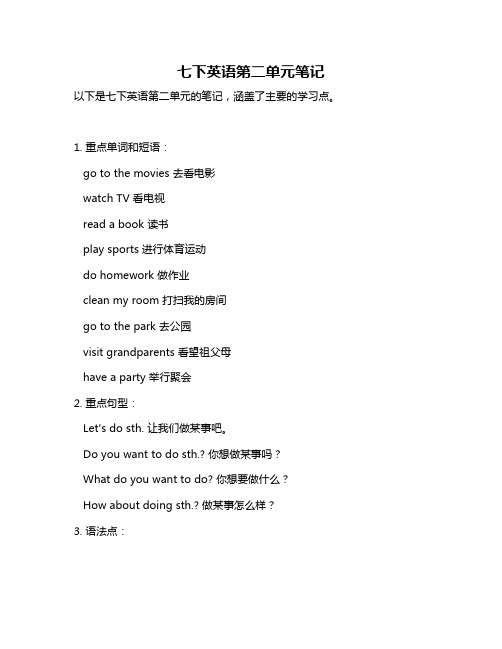
七下英语第二单元笔记以下是七下英语第二单元的笔记,涵盖了主要的学习点。
1. 重点单词和短语:go to the movies 去看电影watch TV 看电视read a book 读书play sports 进行体育运动do homework 做作业clean my room 打扫我的房间go to the park 去公园visit grandparents 看望祖父母have a party 举行聚会2. 重点句型:Let's do sth. 让我们做某事吧。
Do you want to do sth.? 你想做某事吗?What do you want to do? 你想要做什么?How about doing sth.? 做某事怎么样?3. 语法点:现在进行时态(Present Continuous Tense):表示正在进行的动作或正在发生的事情。
结构为“be动词(am/is/are)+动词的现在分词(ing形式)”。
例如:I am watching TV.(我正在看电视。
)动词的ing形式的构成:大多数动词在词尾加“-ing”,如“watching”;以不发音的字母e结尾的动词,先去掉e再加“-ing”,如“reading”;以重读闭音节结尾的动词,如果末尾只有一个辅音字母,应先双写这个字母再加“-ing”,如“running”。
4. 学习建议:结合教材中的对话和活动,多练习使用重点单词和短语,提高口语表达能力。
注意现在进行时态的用法,掌握其基本结构和变体形式,以便在实际语境中运用自如。
除了教材中的例句,可以自己尝试造句,锻炼语言组织能力。
结合个人生活实际,思考自己经常做的事情,用英语表达出来,提高实际应用能力。
新目标(人教)七年级下册英语单元复习课件 Unit 2复习课件

具体时刻,也可询问日期、月份、年份等。 ②when常用来提问年、月、日、上/下午等大概时间,此时
when不可与what time替换。
From twelve o'clock at night to six o'clock in the morning.从夜里十二点到早上六点。
on weekends
radio show
16.几点 ____w_h__a_t_t_i_m__e_______
1178..一半份小有时趣__的__工___作____a__n____i__n__t__e__r__e___s__ti_n_g__j_o_b__ 19.要么……要h么al…f …an;h或ou者r……或者…… ____________________ 20.做作业 _________________________
either...or...
do (one’s) homework
21.去睡觉 __g_o__t_o__b__e_d_________ 2223..到散家 步;__走g__e一_t__走h_o__m_____e_________________________ 24.快速地吃 _________ta__k_e__a__w_a__lk_ 25.做运动 ____________________
play computer games
go home
三、核心句型
1. 里克,你通常几点钟洗淋浴?
__W__h_a_t_ _t_im__e___ do you usually _t_a_k_e__ __a_ _s_h_o_w__e_r,Rick? 2. 我通常在六点半起床。 I _______ ____ _____ at six thirty. 3.u—su—a斯lly科g特et,u你p的广播节目在几点?——从夜里12点到早上6点。 —Scott,________ ________ is your radio show? —_______ wtwhealvte o'cltoimckeat night _______ six o'clock in the morning.
Unit 2【复习课件】七年级英语下册单元复习(牛津译林版)

单词
1. neighbour n. (=neighbor) 邻居 2. will modal v. 将, 将会 3. visitor n. 访问者, 参观者→ _____v_is_it__v. 参观, 访问 4. like prep. 像, 类似; ……怎么样 → _______li_k_e v. 喜欢 5. notice n. 布告, 通知 6. information n. 信息 7. below adv. 下面 8. better adj. 较好, 更好 9. anything pron. 任何事 10. group n. 组, 群
3. They ____h_e_l_p__ us ____w_i_t_h__ all kinds of problems. 他们帮助我们解决各种问题。
4. There’s ____s_o_m_e_t_h_i_n_g__ ___w__r_o_n_g_ _____w_i_th__ my computer. 我的电脑出问题了。
7. It ___w_i_l_l ___ rain this afternoon. 今天下午将要下雨。
8. I ____w_i_ll___ take an umbrella with me. 我将随身带把伞。
9. —___S_h_a_l_l __ we go? 我们将会去吗? —Yes, we will./ —No, we will not. 是的, 我们将会去。/ 不, 我们将不会去。
短语
10. 办公室职员, 上班族 11. 警察局 12. 乘火车/ 公交车/ 轮船/ 自行车 13. 邮局 14.为……担心 15. 感到舒服
office worker police station by train/ bus/ ship/ bike post office worry about fell well
牛津上海七年级英语下知识点复习汇总Unit 2 Going to see a film
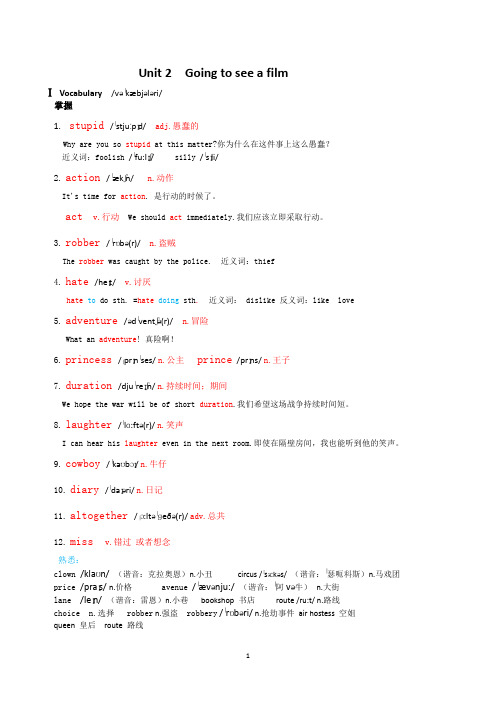
Unit 2 Going to see a filmⅠVocabulary/vəˈkæbjələri/掌握1. stupid /ˈstjuːpɪd/ adj.愚蠢的Why are you so stupid at this matter?你为什么在这件事上这么愚蠢?近义词:foolish /ˈfu:lɪʃ/ silly /ˈsɪli/2.action /ˈækʃn/ n.动作It's time for action. 是行动的时候了。
act v.行动We should act immediately.我们应该立即采取行动。
3.robber /ˈrɒbə(r)/ n.盗贼The robber was caught by the police. 近义词:thief4.hate /heɪt/ v.讨厌hate to do sth. =hate doing sth. 近义词: dislike 反义词:like love5.adventure /ədˈventʃə(r)/ n.冒险What an adventure! 真险啊!6.princess /ˌprɪnˈses/ n.公主prince/prɪns/ n.王子7.duration /djuˈreɪʃn/ n.持续时间;期间We hope the war will be of short duration.我们希望这场战争持续时间短。
ughter /ˈlɑ:ftə(r)/ n.笑声I can hear his laughter even in the next room.即使在隔壁房间,我也能听到他的笑声。
9.cowboy /ˈkaʊbɔɪ/ n.牛仔10.diary /ˈdaɪəri/ n.日记11.altogether /ˌɔ:ltəˈɡeðə(r)/ adv.总共12.miss v.错过或者想念熟悉:clown/klaʊn/ (谐音:克拉奥恩)n.小丑circus /ˈsɜ:kəs/ (谐音:ˈ瑟呃科斯)n.马戏团price /praɪs/ n.价格 avenue /ˈævənju:/ (谐音:ˈ阿və牛)n.大街lane /leɪn/ (谐音:雷恩)n.小巷bookshop 书店route /ru:t/ n.路线choice n.选择 robber n.强盗 robbery/ˈrɒbəri/ n.抢劫事件air hostess 空姐queen 皇后route 路线ⅡPhrase /freɪz/1.take a look=have a look 看一看let's take/have a look around the exhibition./ˌeksɪˈbɪʃn/ n.展览咱们看看展览吧。
七年级下英语Unit 2 复习概要
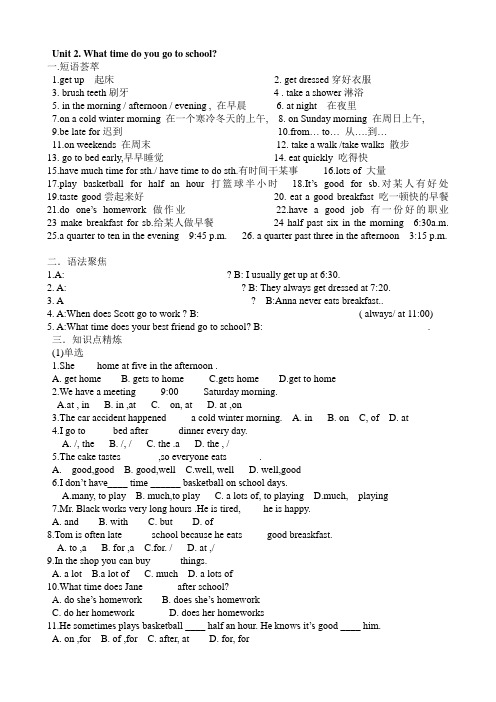
Unit 2. What time do you go to school?一.短语荟萃1.get up 起床2. get dressed穿好衣服3. brush teeth刷牙 4 . take a shower淋浴5. in the morning / afternoon / evening , 在早晨6. at night 在夜里7.on a cold winter morning 在一个寒冷冬天的上午, 8. on Sunday morning 在周日上午,9.be late for迟到10.from… to… 从….到…11.on weekends 在周末12. take a walk /take walks 散步13. go to bed early,早早睡觉14. eat quickly 吃得快15.have much time for sth./ have time to do sth.有时间干某事16.lots of 大量17.play basketball for half an hour打篮球半小时18.It’s good for sb.对某人有好处19.taste good尝起来好20. eat a good breakfast 吃一顿快的早餐21.do one’s homework 做作业22.have a good job有一份好的职业23 make breakfast for sb.给某人做早餐24 half past six in the morning 6:30a.m.25.a quarter to ten in the evening 9:45 p.m. 26. a quarter past three in the afternoon 3:15 p.m.二.语法聚焦1.A: ________________________________? B: I usually get up at 6:30.2. A:___________________________________? B: They always get dressed at 7:20.3. A_____________________________________ ? B:Anna never eats breakfast..4. A:When does Scott go to work ? B:________________________________( always/ at 11:00)5. A:What time does your best friend go to school? B:_________________________________. 三.知识点精炼(1)单选1.She ____home at five in the afternoon .A. get homeB. gets to homeC.gets homeD.get to home2.We have a meeting ____ 9:00 ____ Saturday morning.A.at , inB. in ,atC. on, atD. at ,on3.The car accident happened ____ a cold winter morning. A. in B. on C, of D. at4.I go to_____ bed after _____ dinner every day.A. /, theB. /, /C. the .aD. the , /5.The cake tastes _______,so everyone eats ______.A. good,goodB. good,wellC.well, wellD. well,good6.I don’t have____ time ______ basketball on school days.A.many, to playB. much,to playC. a lots of, to playingD.much, playing7.Mr. Black works very long hours .He is tired,____ he is happy.A. andB. withC. butD. of8.Tom is often late _____ school because he eats ____ good breaskfast.A. to ,aB. for ,aC.for. /D. at ,/9.In the shop you can buy _____ things.A. a lotB.a lot ofC. muchD. a lots of10.What time does Jane ______ after school?A. do she’s homeworkB. does she’s homeworkC. do her homeworkD. does her homeworks11.He sometim es plays basketball ____ half an hour. He knows it’s good ____ him.A. on ,forB. of ,forC. after, atD. for, for12.In the afternoon ,I ____ play soccer ____ watch TV.A. too, orB. either , orC. either , andD. also, or13._________ ? It’s 2:20.A. What’s the timeB. What the timeC.How much is itD. Is it a clock14. She is a _____girl , but she isn’t ____ today.A. good goodB. well,wellC. good wellD. well good15.There are more people ______night than ____ the evening.A. in, in B . at . in C. in. at D. at , on(2)句型转换1.She always gets up so early.(否定句) ___________________________________.2.It’s a quarter past nine.(划线提问) ___________________________?3.My father usually gets up at 6:00 a.m. (划线提问)__________________________________?4.There are many people in the park.(同义句)There are __ ______ _____ people in the park.5.Tom and Bob do their homework every day. 一般疑问句,肯答,否答:_____________________________________? __________________否定句:_________________________ . 划线提问:__________________________________?6.Rick often plays sports in the evening . 一般疑问句,肯答,否答:___________________________________? __________________否定句:_________________________ . 划线提问:__________________________________?7.She eats lots of fruit and vegetables for lunch. (划线提问)____________________________________?8.Students usually eat dinner at a quarter to severn in the evening. (划线提问)________________________________________________?9. It’s six thirty. (同义句)It’s _____ _______________.10.Gina’s family has only one shower. (划线提问)_____ ______ ______ ________ Gina’s family _________?______ happy every day. In the morning she _____ up early . First she helps her mother _____ breakfast. Then she ______ her teeth and eats breakfast. ________ that ,she goes to work .Rita is _______late for work .She likes her job.And she is good ______ her workmates. At the radio station .After work , her workmates often ____her to have dinner with them . But Rita likes to _____ home early and with her parents.五.书面表达: Write about your own daily routine. My dayI have a very healthy life._______________________________________________________ ________________________________________________________________________________ ________________________________________________________________________________ ________________________________________________________________________________ ________________________________________________________________________________ ________________________________________________________________________________ ________________________________________________________________________________ ____________________________________________________________________________。
七年级英语下unit2知识点总结

七年级英语下unit2知识点总结Unit2是初一英语课程中的重要单位,学习过程中我们掌握了很多基础的英语知识和语法规则。
接下来,让我们来总结一下Unit2中的知识点。
一、数词数词是表示数量和数目的词语,包括基数词、序数词、分数、百分数等。
在Unit2中,我们学习了基数词和序数词。
基数词用来表示数量,如one,two,three等。
序数词则用来表示次序,如first,second,third等。
二、a/ana/an是不定冠词,在Unit2中也是我们学习的重点之一。
a用在一个辅音音素开头的单数可数名词前,an则用在一个元音音素开头的单数可数名词前。
三、单数/复数单数和复数是我们英语语法中常见的两种名词形式。
在Unit2中,我们学习了如何将单数名词转化为复数名词。
一般而言,在名词后加-s或-es就可以了,但也有一些名词需要变换拼写才能改变数量。
四、物主代词物主代词用于代指某些事物所属的人或物的身份。
在Unit2中,我们学习了如何使用物主代词:my,your,his,her,its,our和their。
五、人称代词人称代词用于代替人或物的身份。
在Unit2中,我们学习了三种人称代词:主格代词(例如I,you,he,she),宾格代词(例如me,you,him,her)和所有格代词(例如mine,yours,his,hers)。
六、动词的时态动词时态是我们学习英语的重要语法要点。
在Unit2中,我们学习了四种时态:一般现在时,一般过去时,现在进行时和过去进行时。
一般现在时用来描述经常发生的事情,一般过去时用来描述已经发生的事情,现在进行时用来描述正在发生的事情,过去进行时用来描述在过去某个时间正在进行着的事情。
七、短语动词短语动词是由一个动词和一个或多个副词或介词组成的。
在Unit2中,我们学习了一些常用的短语动词,包括get up,go to bed,take a shower等等。
八、情态动词情态动词用于表示情感,意愿,推测和能力。
Unit 2【复习课件】七年级英语下册单元复习(人教版)

考点3;时间的表达法
分类
用法
例子
整点法
时间为整点时, 可用“整点数 It’s five o’clock./It’s five. +o’clock”表示, o’clock 可省略。 现在 5 点(整) 。
“先时后分”, 先读整点数, 再
顺读法
读分钟数, 都用基数词来读。 当分钟数小于10 时, 遇到数字
→ _s_o_m_e__b_r_u_s_h_es
一些刷子
11. tooth n. 牙齿→ ___t_e_e_th____(复数形式)
12. shower n.&v. 淋浴; n. 淋浴器(间)
13. fifty num. 五十→ ___f_iv_e_____五→ __f_if_t_e_e_n___十五
0, 发字母 o 的音/əʊ/。
6:30 为 six thirty 2:58 为 two fifty-eight 4:05 为 four o (/əʊ/) five
重点语法 询问时间与时间表达法
分类
用法
例子
a. 分钟数小于 30 时, 用“分钟数 +past+ 整点数”表示; b. 分钟数为 30 时, 用“half past+ 整 点数”表示; 逆读法 c. 分钟数超过 30 时, 用“60 减去分 钟数+to+ 下一个整点数”表示; d. 分钟数是 15 的倍数时, 可用 quarter表示。
地→__q__u_ic_k___ (形容词) 很快的 26. either conj. 或者 adv. 也→ ___to__o____ (同义词) 27. lot pron. 大量; 许多→___a_l_o_t_o_f___许多
人教七年级下册英语unit2知识点总结
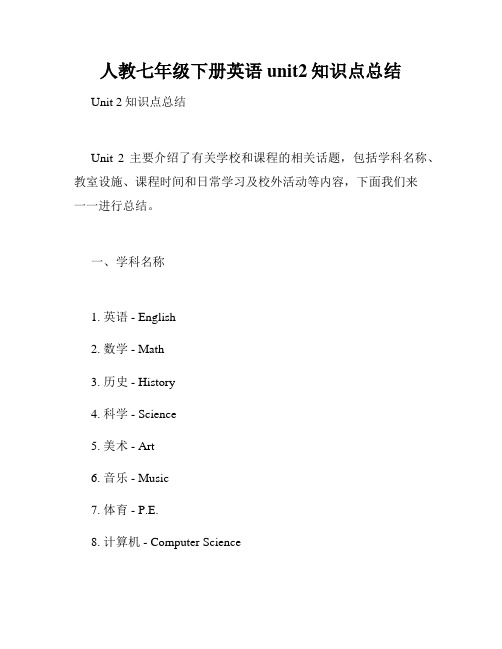
人教七年级下册英语unit2知识点总结Unit 2知识点总结Unit 2主要介绍了有关学校和课程的相关话题,包括学科名称、教室设施、课程时间和日常学习及校外活动等内容,下面我们来一一进行总结。
一、学科名称1. 英语 - English2. 数学 - Math3. 历史 - History4. 科学 - Science5. 美术 - Art6. 音乐 - Music7. 体育 - P.E.8. 计算机 - Computer Science二、教室设施1. 黑板 - blackboard2. 白板 - whiteboard3. 投影仪 - projector4. 音响 - sound system5. 地图 - map6. 水龙头 - tap7. 电视 - TV8. 电脑 - computer9. 灯 - light10. 窗户 - window三、课程时间1. 上午 - in the morning2. 下午 - in the afternoon3. 晚上 - in the evening4. 早上 - in the early morning5. 夜晚 - at night6. 每周 - every week7. 每天 - every day8. 周末 - on weekends四、日常学习1. 做作业 - do homework2. 练习 - practice3. 复习 - review4. 读书 - read books5. 写作 - write compositions6. 讨论 - have discussions7. 板书笔记 - take notes8. 教师讲解 - teacher's explanation9. 学习笔记 - study notes10. 做练习 - do exercises五、校外活动1. 课外活动 - extracurricular activities2. 运动会 - sports meeting3. 聚会 - party4. 社交活动 - social activities5. 英语角 - English corner6. 爱好小组 - hobby group7. 社团活动 - club activities8. 学校之旅 - school trip以上就是Unit 2的主要内容,希望能够帮助大家更好地学习英语,更好地了解学校和课程的相关话题。
七年级英语人教版下册Unit2重点知识点归纳
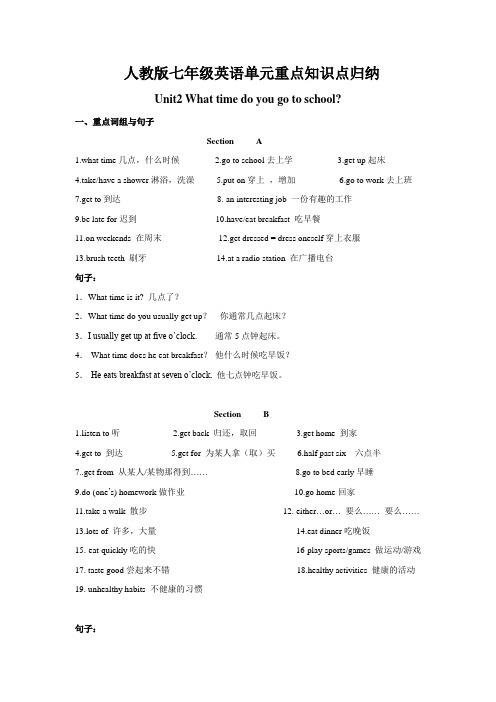
人教版七年级英语单元重点知识点归纳Unit2 What time do you go to school?一、重点词组与句子Section A1.what time几点,什么时候2.go to school去上学3.get up起床4.take/have a shower淋浴,洗澡5.put on穿上,增加6.go to work去上班7.get to到达8. an interesting job 一份有趣的工作9.be late for迟到10.have/eat breakfast 吃早餐11.on weekends 在周末12.get dressed = dress oneself穿上衣服13.brush teeth 刷牙14.at a radio station 在广播电台句子:1.What time is it? 几点了?2.What time do you usually get up?你通常几点起床?3.I usually get up at five o’clock. 通常5点钟起床。
4.-What time does he eat breakfast?他什么时候吃早饭?5.-He eats breakfast at seven o’clock. 他七点钟吃早饭。
Section B1.listen to听2.get back 归还,取回3.get home 到家4.get to 到达5.get for 为某人拿(取)买6.half past six 六点半7..get from 从某人/某物那得到……8.go to bed early早睡9.do (one’s) homework做作业10.go home回家11.take a walk 散步12. either…or…要么……要么……13.lots of 许多,大量14.eat dinner吃晚饭15. eat quickly吃的快16 play sports/games 做运动/游戏17. taste good尝起来不错18.healthy activities 健康的活动19. unhealthy habits 不健康的习惯句子:1.When do students usually eat dinner?学生们通常什么时候吃晚餐?2.I don’t have much time for breakfast.我没有许多时间吃早餐。
七年级下英语unit2知识点归纳

七年级下英语unit2知识点归纳Unit2是一学期英语课程中重要的一部分,本单元主要介绍了一些基础的英语语法和词汇。
下面我们来对Unit2的知识点做个简单的归纳。
一、情态动词情态动词是英语语法中很重要的一部分,它们可以用于表达某种根据语境而定的情态语气。
在Unit2中,我们学习了“can”和“must”这两种情态动词。
它们分别表示能力和必须做的事情。
例如:1. I can swim.(我会游泳。
)2. We must do our homework now.(我们现在必须做我们的作业了。
)二、短语动词短语动词是由一个动词和一个或多个介词、副词、副动词等组成的短语,它们的意思与单独使用该动词时有所不同。
在Unit2中,我们学习了“look after”和“come back”这两个短语动词。
例如:1. Who will look after the dogs when we are away?(我们离开时,谁会照看这些狗?)2. Jack will come back at 5 o'clock.(杰克将在5点钟回来。
)三、反意疑问句反意疑问句是由一个陈述句和一个短语构成,用于表达询问或确认。
通常反意疑问句的意思与其所在的陈述句产生反义关系。
在Unit2中,我们学习了如何构建反意疑问句。
例如:1. You don't like coffee, do you?(你不喜欢咖啡,是吗?)2. Your father is a doctor, isn't he?(你的父亲是医生,对吗?)四、一般过去时态一般过去时态是用于表达已经发生的动作或事件的时间。
在Unit2中,我们学习了如何构建一般过去时态。
例如:1. I studied English last night.(我昨晚学习了英语。
)2. They visited Shanghai last year.(他们去年访问了上海。
)五、名词名词是用于表示某种事物、人或想象的概念的词语。
七年级英语下册第二单元知识点归纳Unit2单元归纳
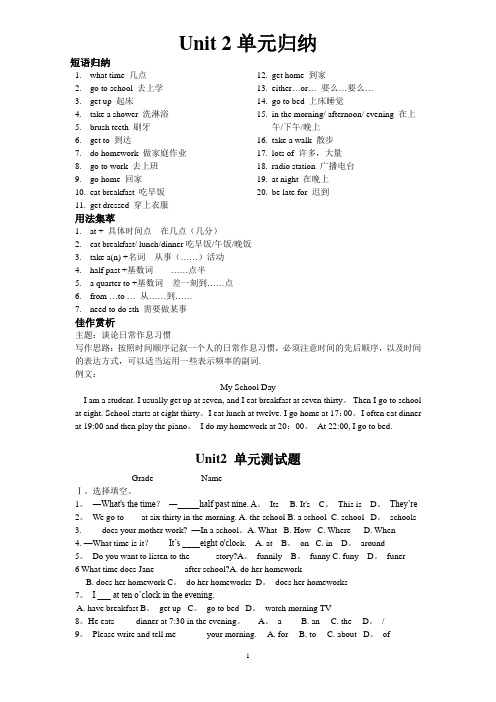
Unit 2单元归纳短语归纳1.what time 几点2.go to school 去上学3.get up 起床4.take a shower 洗淋浴5.brush teeth 刷牙6.get to 到达7.do homework 做家庭作业8.go to work 去上班9.go home 回家10.eat breakfast 吃早饭11.get dressed 穿上衣服12.get home 到家13.either…or…要么…要么…14.go to bed 上床睡觉15.in the morning/ afternoon/ evening 在上午/下午/晚上16.take a walk 散步17.lots of 许多,大量18.radio station 广播电台19.at night 在晚上20.be late for 迟到用法集萃1.at + 具体时间点在几点(几分)2.eat breakfast/ lunch/dinner吃早饭/午饭/晚饭3.take a(n) +名词从事(……)活动4.half past +基数词……点半5. a quarter to +基数词差一刻到……点6.from …to …从……到……7.need to do sth 需要做某事佳作赏析主题:谈论日常作息习惯写作思路:按照时间顺序记叙一个人的日常作息习惯,必须注意时间的先后顺序,以及时间的表达方式,可以适当运用一些表示频率的副词.例文:My School DayI am a student. I usually get up at seven, and I eat breakfast at seven thirty。
Then I go to school at eight. School starts at eight thirty。
I eat lunch at twelve. I go home at 17:00。
Unit2知识归纳人教版七年级英语下册
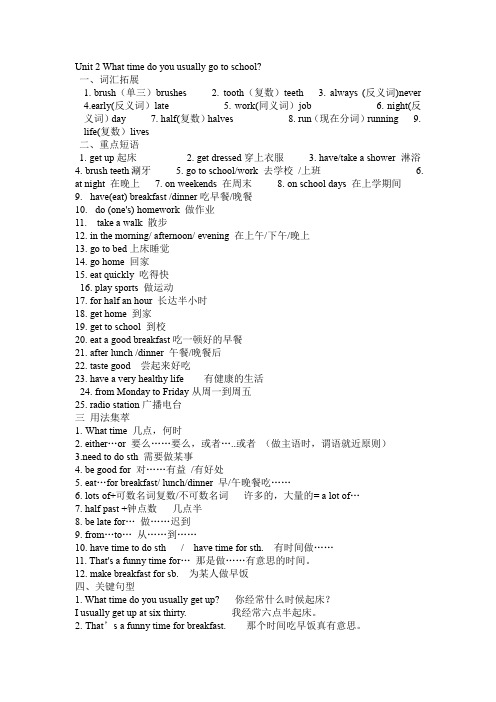
Unit 2 What time do you usually go to school?一、词汇拓展1.brush(单三)brushes2. tooth(复数)teeth3. always (反义词)never4.early(反义词)late5. work(同义词)job6. night(反义词)day7. half(复数)halves8. run(现在分词)running9. life(复数)lives二、重点短语1.get up起床2. get dressed穿上衣服3. have/take a shower 淋浴4.brush teeth涮牙5. go to school/work 去学校/上班6. at night 在晚上7. on weekends 在周末8. on school days 在上学期间9.have(eat) breakfast /dinner吃早餐/晚餐10.do (one's) homework 做作业11. take a walk 散步12. in the morning/ afternoon/ evening 在上午/下午/晚上13. go to bed上床睡觉14. go home 回家15. eat quickly 吃得快16. play sports 做运动17. for half an hour 长达半小时18. get home 到家19. get to school 到校20. eat a good breakfast吃一顿好的早餐21. after lunch /dinner 午餐/晚餐后22. taste good 尝起来好吃23. have a very healthy life 有健康的生活24. from Monday to Friday从周一到周五25. radio station广播电台三用法集萃1.What time 几点,何时2. either…or 要么……要么,或者…..或者(做主语时,谓语就近原则)3.need to do sth 需要做某事4. be good for 对……有益/有好处5. eat…for breakfast/ lunch/dinner 早/午晚餐吃……6. lots of+可数名词复数/不可数名词许多的,大量的= a lot of…7. half past +钟点数几点半8. be late for…做……迟到9. from…to…从……到……10. have time to do sth / have time for sth. 有时间做……11. That's a funny time for…那是做……有意思的时间。
初一下册英语第二单元知识点总结归纳

初一下册英语第二单元知识点总结归纳摘要:一、重点句型及回答1.询问喜好和习惯的句型:What do you like to do? / What habits do you have?2.描述他人喜好的句型:He/She likes to do sth./ He/She has the habit of doing sth.3.表达喜好的回答:I like / I don"t like4.表达习惯的回答:I have the habit of doing sth.二、疑问词和回答1.询问时间:What time do you ...?回答:I usually ...at .../ I often ...at ...2.询问地点:Where do you ...?回答:I ...at .../ I ...in ...三、日常用语和场景1.早上问候:Good morning!2.介绍:Hello, this is .../ Nice to meet you.3.感谢:Thank you / You"re welcome4.告别:Goodbye / See you later四、重点词汇1.学科:math / science / English / physical education2.日常活动:play sports / listen to music / read books / watch TV3.食物和饮料:hamburgers / hot dogs / pizza / juice / coffee正文:初一下册英语第二单元主要涵盖了日常交际用语、疑问词询问、表达喜好和习惯的句型以及日常场景对话等内容。
以下是对这些知识点的详细总结:一、重点句型及回答1.询问喜好和习惯的句型:What do you like to do? / What habits do you have?回答:I like playing sports./ I have the habit of reading books.2.描述他人喜好的句型:He/She likes to do sth./ He/She has the habit of doing sth.例如:My brother likes playing video games./ My sister has the habit of waking up early.3.表达喜好的回答:I like / I don"t like例如:I like pizza./ I don"t like coffee.4.表达习惯的回答:I have the habit of doing sth.例如:I have the habit of exercising every day.二、疑问词和回答1.询问时间:What time do you start school?回答:I start school at 7:30./ I usually start school at 7:30.2.询问地点:Where do you live?回答:I live in a apartment./ I live near the supermarket.三、日常用语和场景1.早上问候:Good morning, classmates!2.介绍:Hello, this is my new friend, Lisa./ Nice to meet you, Lisa.3.感谢:Thank you for helping me./ You"re welcome.4.告别:Goodbye, see you later! / See you tomorrow, classmates!四、重点词汇1.学科:math / science / English / physical education例如:My favorite subject is math./ She is good at English.2.日常活动:play sports / listen to music / read books / watch TV例如:I play soccer after school./ She likes to listen to music in her free time.3.食物和饮料:hamburgers / hot dogs / pizza / juice / coffee例如:My favorite food is pizza./ I drink coffee in the morning.通过学习初一下册英语第二单元的知识点,我们可以在日常生活中更好地与他人进行交流,了解彼此的喜好和习惯。
七年级英语下Unit 2 知识点归纳与复习人教新目标版

新目标七年级下Unit 2 知识点归纳与复习单元知识清单一、重点单词:1. libr r 图书馆2. rest rant 餐馆3. superm ket 超市4. str t 街道5. p k 公园6. c nt 中心7. br ge 桥8. n 在……附近9. acr 横过10. n xt 贴近11. betw n 在两者之间12. fr nt 前面13. t n 转弯14. l ft 左边15. r t 右边16. cl n 清洁的17. qu t 宁静的18. d ty 肮脏的19. h se 房子20. welc m 欢迎21. g den 花园22. enj 欣赏23. w k 散步24. thr 穿过25. begin 开始26. t 旅行27. v s t 参观28. pl ce 地方29. h gry 饥饿的30. a ive 到达31. w 路线32. t ke 乘, 坐33. t x 出租车34. airp t 飞机场35. p ss 通过36. h pe 希望二、必会短语1. post 邮局2. phone 投币式公用电话3. in of 在……前面4. on 在右边5. take 散步6. fun 玩得开心7. turn 向左转8. across 在……对面9. take 坐出租车10. have a 旅途愉快三、应知语法和句式:1. 表示在某地有某物用there be。
如:在这附近有一家银行。
a bank near here.2. There de 的一般问句是将be放到there的前面。
如:有一个超市吗?a supermarket?肯定回答是:Y es, .否定回答是:No, .3. 本课学习的两种问路方式:一种是:用Is there …? 如:在这附近有公用电话吗?a pay phone near here?另一种是:用Where is the …? 如:图书馆在哪?the library?4. welcome to …表示欢迎到某地。
七年级下册英语总复习资料-unit2
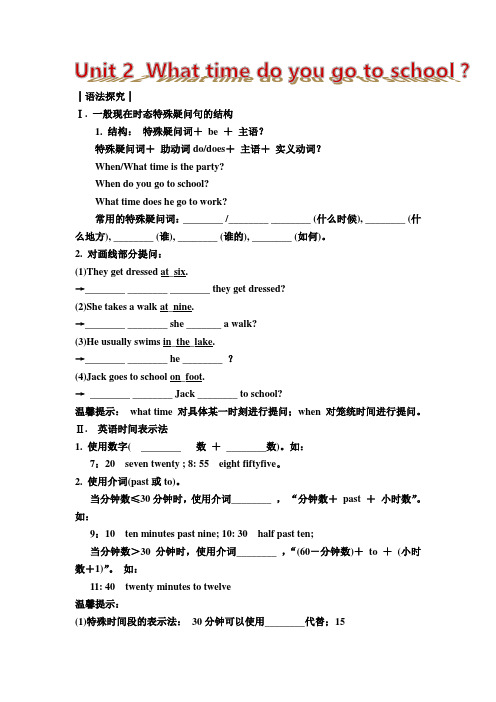
┃语法探究┃Ⅰ. 一般现在时态特殊疑问句的结构1. 结构:特殊疑问词+be +主语?特殊疑问词+助动词do/does+主语+实义动词?When/What time is the party?When do you go to school?What time does he go to work?常用的特殊疑问词:________ /________ ________ (什么时候), ________ (什么地方), ________ (谁), ________ (谁的), ________ (如何)。
2. 对画线部分提问:(1)They get dressed at_six.→________ ________ ________they get dressed?(2)She takes a walk at_nine.→________ ________ she _______a walk?(3)He usually swims in_the_lake.→________ ________ he ________?(4)Jack goes to school on_foot.→________ ________ Jack ________to school?温馨提示:what time 对具体某一时刻进行提问;when 对笼统时间进行提问。
Ⅱ. 英语时间表示法1. 使用数字(________数+________数)。
如:7:20seven twenty ; 8: 55eight fiftyfive。
2. 使用介词(past或to)。
当分钟数≤30分钟时,使用介词________,“分钟数+past +小时数”。
如:9:10ten minutes past nine; 10: 30half past ten;当分钟数>30分钟时,使用介词________,“(60-分钟数)+to +(小时数+1)”。
人教版七年级英语下册 Unit 2知识点与巩固练习
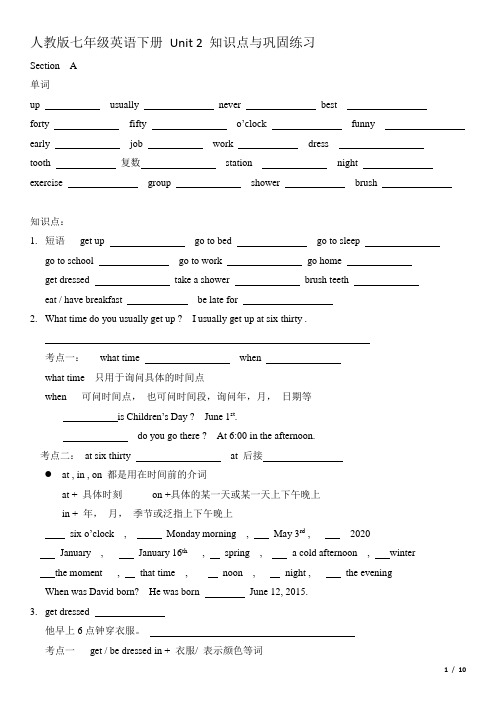
人教版七年级英语下册Unit 2 知识点与巩固练习Section A单词up usually never bestforty fifty o’clock funnyearly job work dresstooth 复数station nightexercise group shower brush知识点:1.短语get up go to bed go to sleepgo to school go to work go homeget dressed take a shower brush teetheat / have breakfast be late for2.What time do you usually get up ? I usually get up at six thirty .考点一:what time whenwhat time 只用于询问具体的时间点when 可问时间点,也可问时间段,询问年,月,日期等is Children’s Day ? June 1st.do you go there ? At 6:00 in the afternoon.考点二:at six thirty at 后接at , in , on 都是用在时间前的介词at + 具体时刻on +具体的某一天或某一天上下午晚上in + 年,月,季节或泛指上下午晚上six o’clock , Monday morning , May 3rd , 2020January , January 16th, spring , a cold afternoon , winter the moment , that time , noon , night , the evening When was David born? He was born June 12, 2015.3.get dressed他早上6点钟穿衣服。
(必考题)初中英语七年级下册Unit 2知识点复习
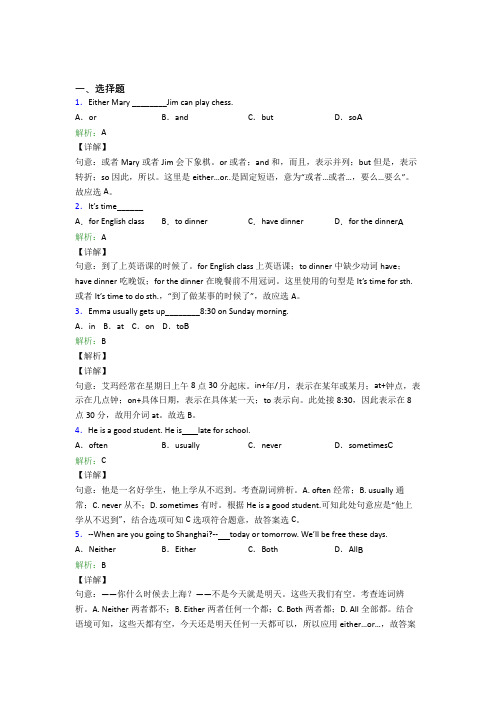
一、选择题1.Either Mary ________Jim can play chess.A.or B.and C.but D.so A解析:A【详解】句意:或者Mary或者Jim会下象棋。
or或者;and和,而且,表示并列;but但是,表示转折;so因此,所以。
这里是either…or..是固定短语,意为“或者…或者…,要么…要么”。
故应选A。
2.It’s time______A.for English class B.to dinner C.have dinner D.for the dinner A解析:A【详解】句意:到了上英语课的时候了。
for English class上英语课;to dinner中缺少动词have;have dinner吃晚饭;for the dinner在晚餐前不用冠词。
这里使用的句型是It’s time for sth.或者It’s time to do sth.,“到了做某事的时候了”,故应选A。
3.Emma usually gets up________8:30 on Sunday morning.A.in B.at C.on D.to B解析:B【解析】【详解】句意:艾玛经常在星期日上午8点30分起床。
in+年/月,表示在某年或某月;at+钟点,表示在几点钟;on+具体日期,表示在具体某一天;to表示向。
此处接8:30,因此表示在8点30分,故用介词at。
故选B。
4.He is a good student. He is late for school.A.often B.usually C.never D.sometimes C解析:C【详解】句意:他是一名好学生,他上学从不迟到。
考查副词辨析。
A. often经常;B. usually通常;C. never从不;D. sometimes有时。
根据He is a good student.可知此处句意应是“他上学从不迟到”,结合选项可知C选项符合题意,故答案选C。
新目标英语七年级(下)Unit_2知识要点归纳

栏纳
dress穿衣服连衣裙brush刷刷子
shower淋浴淋浴器(间)early早地(的)
job工作;职业station电(视)台;车站
night晚上;夜晚funny奇怪的;滑稽好笑的exercise锻炼;练习best最好的(地);最
run跑;奔clean打扫;弄干净干净的walk行走;步行taste有……的味道;品尝味道;滋味get up起床get dressed穿好衣服
brush teeth刷牙eat breakfast吃早饭
take a shower淋浴;洗澡be late for work上班迟到
on school days在上学的日子里take a walk散步
get home到家go to bed上床睡觉
do homework做作业what time什么时间
【重难点句子】
1.—What time do you get up?—I get up at six o’clock.
get up是固定词组,意为“起床”。
be up也有“起床”的意思。
2.take a shower=have a shower洗澡
3.Then I go to school at eight thirty.然后我八点三十分去上学。
4.4:30p.m.下午四点半3:43seventeen to four
33
Copyright©博看网. All Rights Reserved.。
- 1、下载文档前请自行甄别文档内容的完整性,平台不提供额外的编辑、内容补充、找答案等附加服务。
- 2、"仅部分预览"的文档,不可在线预览部分如存在完整性等问题,可反馈申请退款(可完整预览的文档不适用该条件!)。
- 3、如文档侵犯您的权益,请联系客服反馈,我们会尽快为您处理(人工客服工作时间:9:00-18:30)。
七年级英语学案(下)
Unit 2 What time do you go to school? 编号:.2
主备人:王菲菲审核人:李安宁班级:_______姓名:_______
Ⅰ.Learning aims (学习目标)
1. 复习重点词汇和句型。
(重点)
2. 复习时间的表述,并能和动词词组进行综合运用,形成短文概括自己
和他人的活动。
(难点)
Ⅱ. Classroom Inquiry(课堂探究)
1.Self-study (自主学习)
1. 去上学go to school
2. 起床get up
3. 刷牙brush one’s teeth
4. 吃早餐eat/have breakfast
5. 洗澡take a shower
6. 回家go home
7. 去工作go to work 8. 穿衣get dressed
9. 上班迟到be late for work 10. 在上午in the morning
11. 在下午in the afternoon 12. 在晚上in the evening
13. 吃晚餐eat dinner 14. 去睡觉go to bed
15. 做作业do homework 16. 散步take a walk
17. 半小时half an hour 18. 在8点半at half past eight
19. 在七点一刻at a quarter past seven
20. 打扫房间clean one’s room21. 早睡go to bed early
22. 在电台工作work at a radio station 23. 有趣的工作an interesting job 24. 吃得快eat quickly 25. 或者……或者……either... or...
26. 尝起来好taste good 27. 健康的生活a healthy life
28. 顺读法:“钟点+分钟”
如:eight ten 8点10分(8:10)eight five 8点零5分(8:05)
29. 逆读法:“分钟+介词past”或“to+钟点”。
a.当分钟不超过30分钟时(包括30分钟),用past表示“几点过几分”。
其结构为:“分钟数+past+钟点数”,这里的past是“过”的意思,意为;“几点过几分”。
如:
five past two 2点过5分half past eight 8点半
b.如果后面的分钟数超过半小时,则用“分钟数+to+钟点数”结构,这里的“to”是“不到;差”的意思,表示“几点差几分”。
如:
five to nine 8点55分(9点差5分)ten to twelve 11点50分(12点差10分)a quarter to seven 6点45分(7点差1刻)
2.Cooperation(合作研讨)
3.Display (展示讲解)
4. Make a summary.(知识归纳)
Ⅲ. Exercises in class(分层训练):
一. 巩固练习用所给动词的适当形式填空。
1.We have much ________(work) every day.
2.What time her father (get)home.
3. She wants (brush)her teeth .
4.When your uncle often (start) his work ?
5. Either your parents or your brother _________(watch) TV.
6. People love ___________ (listen) to him.
7. He ________(brush) his teeth and __________(have) a shower..
8. It's 7 o'clock. Let's _____ (go) home.
9. Our teacher works 8 _______(hour)a day in the school..
10. It tastes________(well). I like it very much.
11. I have a _________(health) life. Fruits are good for my______(health).
12. Either you or I __________(be)wrong.
二.提升训练单项选择
( )1.___________ weekends we go to school ___________ 7 o'clock.
A. In; at
B. On; at
C. On; in
D. In; on ( )2.We have ___________ breakfast ___________ morning.
A. the; in
B. /; in the
C. the; in the
D. /; in
( )3.It’s time ___________ lunch.
A. to
B. for have
C. for the
D. to have ( )4.She ___________ to the shop ___________ Saturday afternoons.
A. goes; in
B. go; on
C. goes; on
D. go;in ( )5. Music is good ____our life. And my friend is good ____music.
A. at, for
B. for, at
C. with, for
D. at, with ( )6. Mary eats ______ fruit and vegetables for lunch.
A. a lot
B. lots of
C. lot of
D. much ( )7. Lucy ______ at school on Sundays.
A. usually is
B. is usually
C. usually are
D. are usually Ⅳ. 教后记:__________________________________________ 学后记: ___________________________________________。
